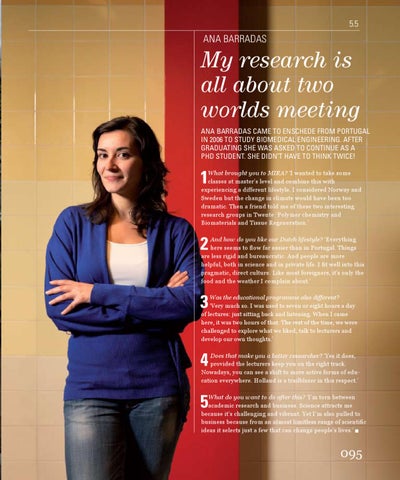5.4
5.5
JARICH SPLIETHOFF
Ana barradas
Suddenly you find you can save lives
My research is all about two worlds meeting
Jarich Spliethoff is set to graduate in technical medicine. After five years of study, lots of jobs on the side and four placements, he’s almost ready to make the big leap.
Ana Barradas came to Enschede from Portugal in 2006 to study biomedical engineering. After graduating she was asked to continue as a PhD student. She didn’t have to think twice!
1
How do you look back on your degree programme, now it’s almost finished? ‘Technical medicine is seen as a hard degree programme within the University of Twente: six years, with a timetable of up to eight hours a day. But I’ve always really enjoyed it, so I didn’t mind working hard. The typical technical medicine student is energetic and enterprising; it’s no coincidence that I often meet fellow students on committees of student associations.’
2
During your placement, was it a shock to suddenly find yourself in a hospital, with real patients, some of whom seriously ill? ‘Yes, but mainly in a positive sense. During my degree, I’d mainly been concerned with solving theoretical problems and doing sums. Suddenly, you realise you can use that to save people’s lives! That was a real eye-opener.’
3
Soon you’ll have graduated. What then? ‘I can see myself starting up my own business some day, once I’ve had a good idea. But first I want to get to know the medical world a bit better.’
4
How has that medical world welcomed you so far? ‘There’s a small group of doctors who still have to get used to our role. They sometimes make disparaging comments like: “So you’ve come to twiddle the knobs then?” But most doctors are surprised about what we can contribute and say that there’s an enormous demand for our know-how.’
094
MIRA in·sight | chapter 05
|
Education at MIRA and University of Twente
1
What brought you to MIRA? ‘I wanted to take some classes at master’s level and combine this with experiencing a different lifestyle. I considered Norway and Sweden but the change in climate would have been too dramatic. Then a friend told me of these two interesting research groups in Twente: Polymer chemistry and Biomaterials and Tissue Regeneration.’
2
And how do you like our Dutch lifestyle? ‘Everything here seems to flow far easier than in Portugal. Things are less rigid and bureaucratic. And people are more helpful, both in science and in private life. I fit well into this pragmatic, direct culture. Like most foreigners, it’s only the food and the weather I complain about.’
3
Was the educational programme also different? ‘Very much so. I was used to seven or eight hours a day of lectures: just sitting back and listening. When I came here, it was two hours of that. The rest of the time, we were challenged to explore what we liked, talk to lecturers and develop our own thoughts.’
4
Does that make you a better researcher? ‘Yes it does, provided the lecturers keep you on the right track. Nowadays, you can see a shift to more active forms of edu cation everywhere. Holland is a trailblazer in this respect.’
5
What do you want to do after this? ‘I’m torn between academic research and business. Science attracts me because it’s challenging and vibrant. Yet I’m also pulled to business because from an almost limitless range of scientific ideas it selects just a few that can change people’s lives.’
095
